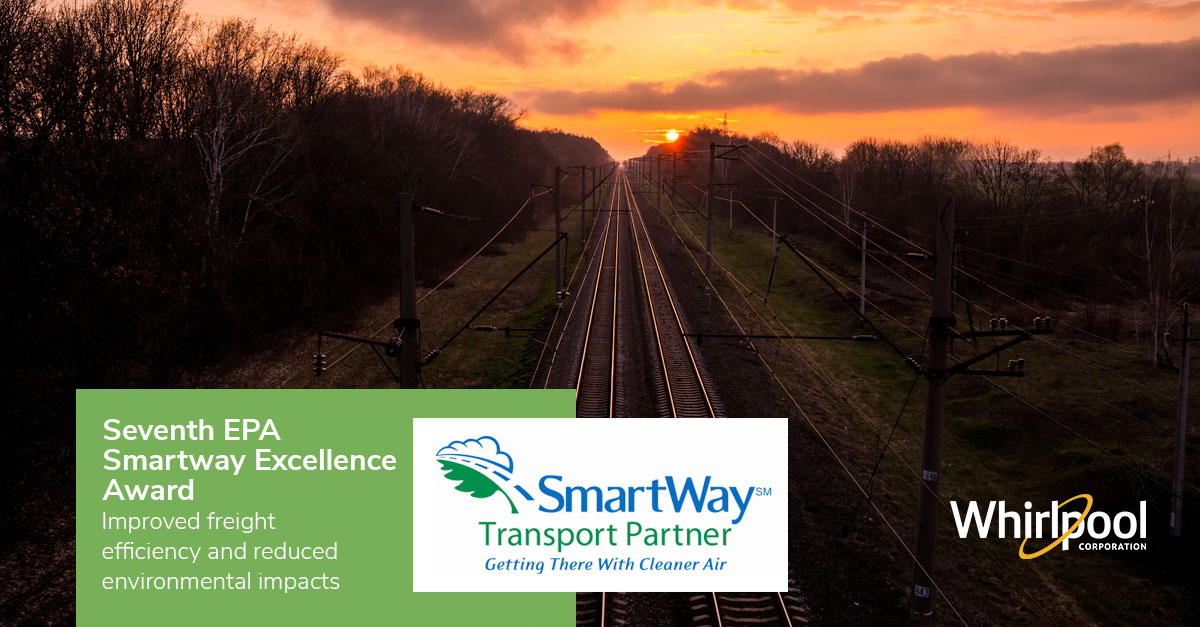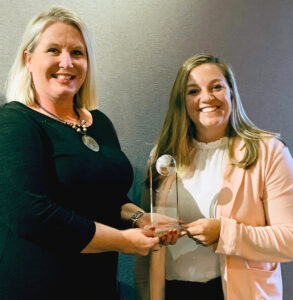
Whirlpool Corporation’s Integrated Supply Chain team has once again received a Smartway Excellence Award in 2021, recognizing its exceptional freight performance among Environmental Protection Agency (EPA) SmartWay Partners. SmartWay Excellence awardees lead their industries by improving freight efficiency and contributing to cleaner air throughout their supply chains. The award is very competitive, with awardees chosen from over 3,700 companies and organizations participating in the SmartWay program. Whirlpool Corporation was also named a “High Performer” for the fifth straight year.
“I think as employees and consumers, we should always be looking for ways to do things better and more efficiently, especially for the environment,” said Whirlpool Corporation Transportation Sr. Manager Brie Lieto. “Whirlpool is in constant pursuit of environmental sustainability, going back to 1970 when our first environmental team was created. Today, we’re accelerating our progress by delivering on our commitments to improve the environmental efficiency of our plants and products while making a positive impact on people and the planet. That’s one of the reasons we are proud SmartWay partners.”
Whirlpool is in constant pursuit of environmental sustainability, going back to 1970 when our first environmental team was created. Today, we’re accelerating our progress by delivering on our commitments to improve the environmental efficiency of our plants and products while making a positive impact on people and the planet. That’s one of the reasons we are proud SmartWay partners.”
There are several ways that Whirlpool Corporation works to improve the efficiency of its supply chain and contribute to cleaner air as a result of fewer carbon emissions. One method is to move products on particular modes of transportation that are preferred for their energy efficiency.
“We use both trains and semi trucks as modes of transportation for our products,” said Lieto. “Typically you will see better fuel and fewer emissions with trains, but you’ll also have longer lead times, so it’s definitely a balancing act. We also have to layer in where there’s capacity (rail or truck) to do either. We largely use intermodal (rail) out of our Factory Distribution Centers (FDCs) to ship to customers or to our Regional Distribution Centers (RDCs), especially out of our Mexico and Ohio Manufacturing sites.”
There are also new innovations that the ISC team investigates on a regular basis to improve freight efficiency.
 “We are actively partnering with our fuel management supplier on their innovative tool to benchmark the contract freight market,” said Whirlpool Corporation Supply and Logistics Manager Ana Cantu. “This tool allows us to identify market density opportunities and further research partnerships with other shippers to reduce backhaul empty miles, as well as providing visibility to mode conversion opportunities.”
“We are actively partnering with our fuel management supplier on their innovative tool to benchmark the contract freight market,” said Whirlpool Corporation Supply and Logistics Manager Ana Cantu. “This tool allows us to identify market density opportunities and further research partnerships with other shippers to reduce backhaul empty miles, as well as providing visibility to mode conversion opportunities.”
Cantu refers to several different important supply chain terms that are necessary to understand in order to really comprehend the many factors being considered by her team when moving products in the company’s supply chain. “Freight modes” are the different freight shipping transportation options available, such as truck, ship, train and plane. “Mode conversion” is the conversion between these modes. The “density of freight” refers to the density of truck freight shipments along major highway corridors. “Backhauling” refers to the practice of carrying freight back from a destination on an empty truck, which shippers can do on their own or partner with other shippers on in order to maximize their loads.
Lieto and her team are proud to have once again earned this honor from the EPA. “It’s a confirmation that all the hard work we put in every day is not only valued and recognized at Whirlpool, but industry-wide through SmartWay,” she said. “Being recognized seven years in a row is a true testament that it’s really a core part of our network and processes here at Whirlpool Corporation.”